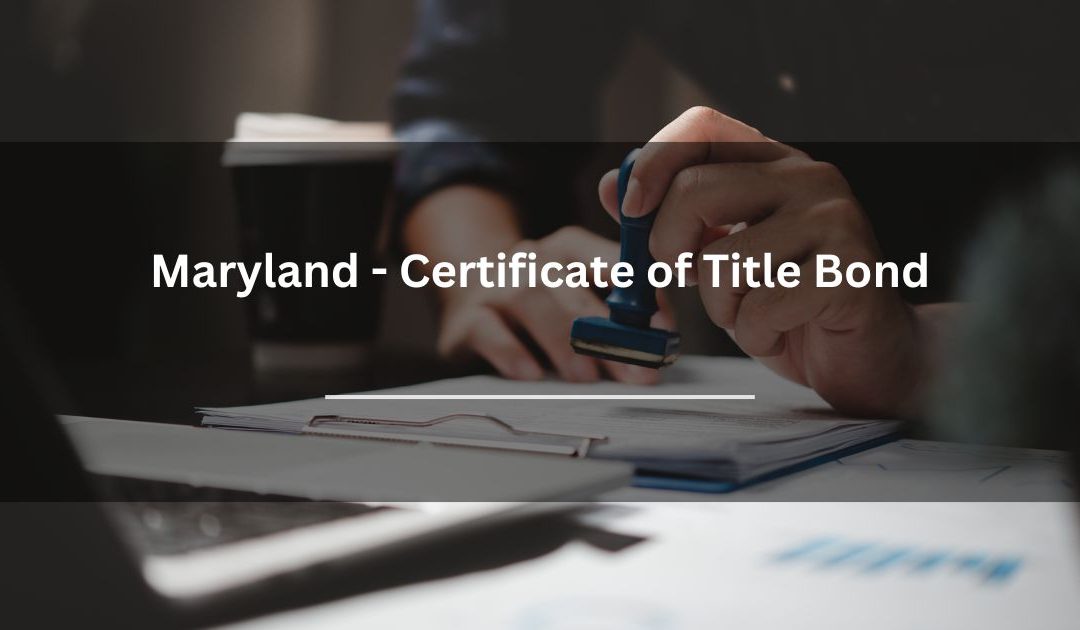Get an Instant Quote on Certificate of Title Bond
Introduction
From our perspective, vehicle owners in Maryland sometimes encounter challenges when attempting to register vehicles with missing, defective, or unclear ownership documentation. The Maryland – Certificate of Title Bond resolves these issues by guaranteeing that the vehicle owner has a legitimate claim to the title. This bond protects against potential claims by other parties who may later assert ownership rights.
Similar to the Montgomery County, MD – Solid Waste Disposal Charges Bond, which ensures compliance with disposal fee payments, the Maryland – Certificate of Title Bond ensures that vehicle title transactions proceed legally and protect the interests of all parties involved.

Challenges Associated with Title Bond Requirements
We’ve noticed that many vehicle owners misunderstand the purpose and requirements of the Maryland – Certificate of Title Bond. Some assume that filing a lost title application automatically resolves ownership issues, without realizing that the bond is necessary to protect against fraudulent claims. Others mistakenly believe that a title bond is only required for high-value vehicles, when in reality, it is often needed for various situations, including cases of incomplete or unclear title documentation.
Misconceptions similar to these often arise with the Frederick County, MD – Landfill Use Bond, where businesses may be unaware that a bond is required to guarantee proper use of landfill facilities.
Swiftbonds: Your Guide to Title Bond Compliance
Based on our experience, Swiftbonds has successfully assisted countless vehicle owners in securing the Maryland – Certificate of Title Bond, ensuring that they comply with Maryland’s Motor Vehicle Administration (MVA) regulations. Swiftbonds simplifies the bond application process, offering step-by-step assistance and expert guidance to ensure that clients receive their bonded titles quickly and without complications.

Steps to Obtain a Certificate of Title Bond
What we’ve discovered is that obtaining the Maryland – Certificate of Title Bond involves a few key steps:
-
Determine Bond Eligibility – Verify with the Maryland MVA whether the vehicle qualifies for a bonded title and confirm the bond amount required.
-
Calculate the Bond Amount – The bond amount is set at 1.5 times the vehicle’s appraised value as determined by the Maryland MVA.
-
Select a Licensed Surety Provider – Work with a reputable surety provider, such as Swiftbonds, that is authorized to issue bonds in Maryland.
-
Submit the Bond Application – Provide details about the vehicle, including make, model, year, and vehicle identification number (VIN).
-
Receive and File the Bond – Once approved, submit the bond to the Maryland MVA to complete the title application process.
Swiftbonds offers guidance at every step, ensuring that applicants meet all Maryland MVA requirements without delay.
Consequences of Failing to Obtain a Certificate of Title Bond
In our observation, failing to secure a Maryland – Certificate of Title Bond can prevent a vehicle owner from legally registering their vehicle or obtaining a valid title. Without a bonded title, the MVA may deny title applications, leaving the vehicle without legal documentation. Additionally, disputes over ownership may arise, exposing the vehicle owner to potential financial loss and legal complications.
Similar consequences can occur when businesses fail to comply with the Montgomery County, MD – Solid Waste Disposal Charges Bond, where non-compliance with bonding requirements may result in penalties and suspension of operations.

Advantages of the Certificate of Title Bond
We’ve learned that securing a Maryland – Certificate of Title Bond offers multiple benefits for vehicle owners:
-
Establishes Legal Ownership – Provides a clear legal path for obtaining a bonded title, allowing the vehicle to be registered and operated legally.
-
Protects Against Ownership Claims – Safeguards against future ownership disputes by ensuring financial compensation if another party claims ownership.
-
Speeds Up Title Issuance – Enables vehicle owners to move forward with the title application process without unnecessary delays.
These advantages mirror those provided by the Frederick County, MD – Landfill Use Bond, where compliance with bonding requirements ensures smooth operations and financial accountability.
Maryland’s Legal Framework for Title Bonds
Maryland’s MVA enforces strict regulations regarding title bonds to protect public interests and prevent fraudulent vehicle transactions. The Maryland – Certificate of Title Bond is required under Maryland Transportation Article § 13-1101, which mandates that individuals applying for a bonded title provide a bond equal to 1.5 times the vehicle’s appraised value.
The bond remains in effect for three years, protecting against potential claims during that period. This regulatory framework ensures that all title bond applicants meet Maryland’s strict ownership verification standards. Similar to the oversight provided by the Montgomery County, MD – Solid Waste Disposal Charges Bond, this framework ensures compliance and accountability.

Conclusion
We’ve come to appreciate that securing a Maryland – Certificate of Title Bond is a critical step for vehicle owners who need to resolve title discrepancies and protect their ownership rights. This bond offers a clear path toward obtaining a bonded title, ensuring compliance with Maryland MVA regulations and protecting against future ownership claims.
Swiftbonds has established a reputation for guiding clients through the title bond process with efficiency and expertise. Whether obtaining a Maryland – Certificate of Title Bond or securing a Frederick County, MD – Landfill Use Bond, Swiftbonds provides reliable solutions tailored to meet the specific needs of each client.
Frequently Asked Questions
When is this bond required?
The Maryland – Certificate of Title Bond is required when the original vehicle title is lost, damaged, or contains errors that prevent the issuance of a clean title. It is also necessary when a vehicle owner lacks sufficient documentation to prove ownership.
How is the bond amount determined?
The bond amount is calculated at 1.5 times the vehicle’s appraised value. The Maryland MVA determines the vehicle’s value based on its condition, make, model, and year.
How long does a Certificate of Title Bond remain valid?
The bond remains valid for three years from the date of issuance. During this period, the bond protects against ownership claims by other parties.
Where should the Certificate of Title Bond be submitted?
The bond must be submitted to the Maryland MVA along with the vehicle title application and any supporting documentation to complete the bonded title process.
Can any surety company issue a Certificate of Title Bond in Maryland?
No, the bond must be issued by a licensed surety provider authorized to operate in Maryland. Swiftbonds meets all licensing requirements and provides fully compliant bonds in the state.


